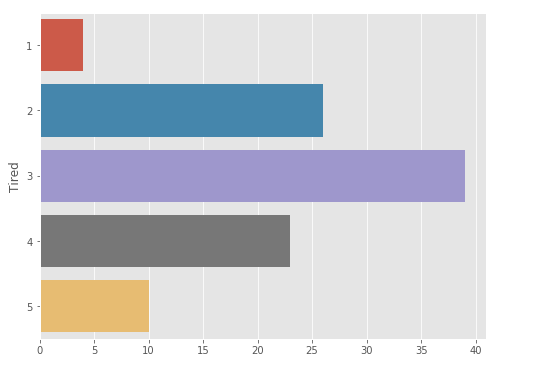A lot of people are not content with the number of hours they sleep per night. Throughout your week, you might hear a few people complain that they are tired or they didn’t sleep enough. You might even hear others express how energized they are for the day to begin. Sleep is very important in your everyday life. Can you still be tired even after getting enough sleep? The truth is, sleep can dictate the way your day might lay out in front of you and even what you do before sleep contributes.
Data
I found my data off the website Kaggle. This was a fantastic way to test the skills I’ve been learning. The csv.file I used contained a dataset with 104 observations and 6 columns of sleeping habits to determine if students were satisfied with the amount of sleep they get. Upon downloading this data and cleaning it up a bit, I was able to find out a few observations.

One night of short sleep can affect you the next day. Getting enough sleep is important, but good sleep quality is also essential. Signs of poor sleep quality include feeling sleepy or tired even after getting enough sleep, repeatedly waking up during the night, and having symptoms of sleep disorders. After cleaning the data and assigning 0 or 1 for yes and no, I was able to get a graph to see all of this data. The purpose is to show the value for all the columns. I can see that the majority of people believe they do not get enough sleep. I also see that most people typically eat breakfast in the morning and are on their phones before they sleep.

I wanted to see if there was a correlation with the number of hours slept and if people were still tired. In this finding, I saw there was a small correlation and it’s the more hours slept, the student was found to be a little less tired. The average amount of sleep a student has was 6 hours and 36 minutes. If students tend to sleep more than 7 hours or less than 6 hours, they also too are known to be more tired than the rest.


Next, I can look at different ways we can affect our sleep by not even knowing. Keeping your phone on your nightstand may not seem like a big deal, but technology affects your sleep in more ways than you realize. I wanted to see how many students rated tired and what was the amount of hours they slept. Reducing melatonin makes it harder to fall and stay asleep. Most Americans admit to using electronics a few nights a week within an hour before bedtime. But to make sure technology isn’t harming your slumber, give yourself at least 30 minutes of gadget-free transition time before hitting the hay.
While you rest, your brain stays busy, it keeps your body running in top condition, preparing you for the day ahead. Without enough hours of sleep, you won’t be able to work, learn, create, and communicate at a level even close to your true potential. Regularly skimp on “service” and you’re headed for a major mental and physical breakdown. You may not be noticeably sleepy during the day, but losing even one hour of sleep can affect your ability to think properly and respond quickly. Some people sleep eight or nine hours a night but don’t feel well-rested when they wake up because the quality of their sleep is poor. For adults, the correct hours needed for sleep are 7-9 hours. It’s even appropriate to sleep for 6 hours. In the student survey, the mean of the people says they sleep for 6.6 hours. I want to know if people think they get enough sleep during the weekdays. In this graph, I see that forty students(3) are kind of tired/kind of not. Twenty-seven(2) students say they are just a little tired, not really. Next, twenty-three(4) students say that they are actually pretty tired. Ten students say that they are actually really tired and we have just four students who say they are not tired at all.

Conclusion
Our need for sleep will only increase if we do not take care of the quality of our sleep. We need to make sure we are paying attention to phone usage before going to bed. Being on the phone before bed reduces the total amount of REM sleep, and compromises alertness the next morning. Over time, these effects can add up to a significant, chronic deficiency in sleep. After going throug this data, I can say that students believe they are not tired if they gain quality sleep. Sixty-eight percent of the students in this survey suggest that they do indeed get enough sleep and are not tired in the morning. Thirty-two percent of students suggested otherwise. Sleep is known to keep your heart healthy, it can also reduce stress in your life. A finding I found cool was that sleep Improves Your Memory. The most important to me about this is that sleep helps the body repair itself. Also, remember that it’s important for the body to get at least 6-9 hours of sleep. Children and teens need even more. Sleep is something we all take for granted, remember it’s about quality, not quantity.
Reference
http://healthysleep.med.harvard.edu/healthy/matters/benefits-of-sleep/learning-memory
https://www.kaggle.com/mlomuscio/sleepstudypilot
https://www.helpguide.org/articles/sleep/sleep-needs-get-the-sleep-you-need.htm